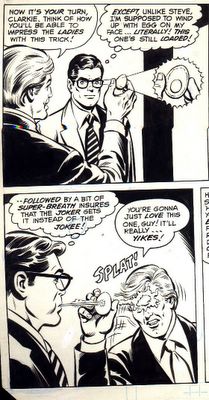Hey boys and girls! Look who's back! I've read some really great comments from some really nice people about my last post on "Lessons in Magic You Won't Learn Anywhere Else," so I've decided to add two more to the list:
(1a) If you're on a TV show, DON'T play to the spectators. I recently finished shooting two episodes worth of material for my upcoming TV special (yes, let's get this out of the way - I will be having a TV special) and only got to see the footage when we went into the editing room. I learned a hard lesson very quickly: no matter how many directions you give a cameraman (or camerawoman), they'll never be exactly where you'll need them. Furthermore, they tend to shoot wide and long because they usually try to include you, your props, and your spectators all in one shot (the production company only gave me one camera to work with and a crew of two) - this means that the viewers at home won't be able to see, for example, what the card is that you're holding. So, if you're doing a TV special or are being filmed doing magic, IGNORE the rule that most will tell you: "Play to the spectator. Try to get yourself and your spectators to forget that the cameras are even there." That rule is just flat out WRONG. Here's the REAL rule:
Play to the cameras first, the spectators second. The underlying thinking behind this rule is this:
Who gives a fuck about your spectators' reactions if the viewers at home (your REAL audience) can't fucking see or understand a thing?(1b) If you're on TV, DON'T tell your director or cameraman everything that's going to happen in the effect. Now, you do need to tell them about the key moments in the trick and when they can't be filming you (i.e. the camera shouldn't be zoomed into your hands when you're doing a pass). However, if you only give them a rough sketch, you can treat the camera as another spectator. I found that my best shots happened with tricks my camerawoman knew little about because she was just as misdirected as my actual spectators. You already know how to control your spectators' attention during a trick (you do, right?), so controlling the camera becomes much easier when the camerawoman is as easily misdirected.
(2) Watch stand-up comedy and hang out with them after the show if you can. You'll notice that the world of stand-up comedy is very similar to the world of magic - except stand-up comedians aren't assholes. Stand-up comedians take HUGE risks on stage, whereas most magicians don't. You'll also realize this dirty little secret: most talking magicians are stand-up comedians with crutches. As a magician, if your joke bombs, you still have an effect to cover your ass; comedians don't have this safety net. That being said, bomb a joke as a comedian and you get another shot with the audience; fuck up a magic trick completely and it's a freakin' steep uphill battle to even save face. You'll also learn things like timing, audience interaction (watch a COMEDIAN handle hecklers - heck, some even make that part of their act), and how to be funny. If you remember the last two lessons from the last post, you'll recall that it's more important to entertain an audience than to fool them, so, if you learn how to make people laugh, you may be able to actually fight that uphill battle if anything goes wrong.
Good luck! Remember, ENJOY your magic. If you ENJOY, your audiences will ENJOY.
